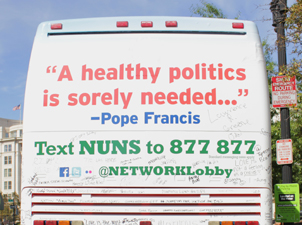
Choosing Engagement over Alienation
Sister Mary Ellen Lacy
July 6, 2018
The other day, my NETWORK colleagues, sisters and other women of faith attended a prayer vigil in front of the Customs and Border Patrol Building in Washington, D.C. We were there to pray for a conversion of hearts for those who peel crying children from their mothers in the name of justice, or worse, in the name of God. There were stirring testimonies, prayers and songs sent to heaven on behalf of the little ones. I cannot think about this situation without fighting back my own tears of pain and anger.
When it was over, we decided to take an Uber home. The Uber driver was an affable older man who sported a leather cowboy hat and greeted us with a heartfelt smile. After we were loaded up, we had to wait because the President’s motorcade was driving by. The Uber driver then shared with us that he was a ‘Trump Supporter’ and that children have been taken at the border for 12 years. He wondered aloud, “why do people blame ‘the poor guy’ [Trump] for everything when he only does the same as all the rest before him?”
In these scary times, people who have opposing opinions may seem evil and perhaps we see them as an enemy to our basic notion of being a Christian or American. Often, out of anger and fear, we marginalize them and deport them from our hearts.
Dr. Martin Luther King Jr. taught us that, in order to love your enemies, you must begin by analyzing self. There may be something within you that arouses a tragic hate response to the other individual. So, we must examine ourselves. Once we remove the plank from our own eye, as needed, we should remember that even the person who hates us most has some good in him, some of God in him. Thirdly, if we get the opportunity to devour our enemy, we should not take it.
My instinct was to scream when I heard the oft repeated ‘Somebody else did it too’ defense. Instead, I offered that in the past it was not done for the same reasons or to the degree it is being done today. He seemed a little unnerved and his voice became strained and louder. Clearly, I had struck a chord. He repeatedly told me to ‘check the facts’ as he defended the new policy. I offered my personal experience at the border to counter his impression to no avail. It occurred to me, although we did, indeed, have the facts, that was not going to change his heart. We did not need to embarrass him or prove him wrong because that was equally unhelpful. At this point, one of my companions awkwardly tried to change the subject.
We got quiet for a moment. I questioned whether I had unnecessarily provoked the angry response. However, the need for engagement, speaking up in our daily lives and transformational conversations with those of differing opinions beckoned me to attempt communion with this man. Protests and vigils have impact but real transformation calls us to remain in the uncomfortable conversation. Besides, this was a nice man who merely thought differently than I did. I should be able to talk with him. If we want the suffering of our sisters and brothers to end, we must be able to talk with each other. After all, God made me and God made him. We always have that much in common with another person.
So, allowing for the possibility that he had a piece of the truth, I asked him what he had hoped would happen in this situation? He relaxed his delivery but he still believed that immigrants should ‘go home’ and come back legally. His heart softened as he entered into a dialog with us and released the angry rhetoric he first presented to us. A few minutes into this more humble exchange, he came to admit that separating kids from their parents is a bad thing. By the end of the ride, he shared other political views that we could own, too. He even conceded a tax/budget issue to my companion and said he enjoyed our conversation.
When faced with the opportunity to deport this man from our hearts and devour him with facts, we chose to welcome the God within him and he responded in kind. I was grateful for our conversation because it reinforces to me that, if we can be generous to each other on the ground, and we elect leaders who mirror our values, then we have a chance of changing Congress.
Let us model the community and courageousness we hope to see in the halls of Congress.








Thank you Mary Ellen,
What a wonderful piece! Remaining in the uncomfortable space and seeking the common ground continue to be the challenge.
The complexity of immigration laws, policies and procedures is unknown to most, even to those of us who practice in the field.
Family detention is not the answer to family separation. There is a process due to those arriving at our borders. Let’s do it!